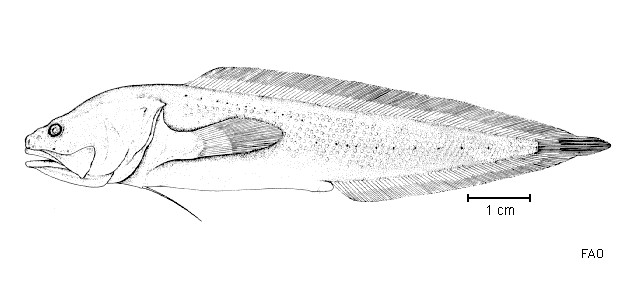| Bythitidae (Livebearing brotulas) |
| 8.7 cm SL (male/unsexed); 8.1 cm SL (female) |
|
bathydemersal; marine; depth range 265 - 600 m |
| Indian Ocean: India, Bay of Bengal and Gulf of Aden. |
|
Dorsal soft rays (total): 83-85; Anal soft rays: 53-56; Vertebrae: 53-55. This species is distinguished from its congeners by the following set of characters: distinct pair of (probably) free spines on frontal plate above and behind eyes; strong ethmoidal spine located in front of eyes; with scales on sides of body but not on predorsal; some specimens possess ventral arm of opercle terminating in a short spine; opercular spine free, with one prong; with 2 posterior infraorbital pores, 1 supraorbital pore at upper angle of gill opening and 1 posterior mandibular behind maxillary; anterior gill arch with 3 long rakers about half length of longest filaments; pectoral peduncle is elongated; with several tooth rows on palatines; vertebrae, precauda 12-13, total 53-55; fin D 83-85, A 53-56, pectoral 17-18 (Ref. 93007). |
| Rare species (Ref. 34024). |
|
Data deficient (DD); Date assessed: 16 August 2019 Ref. (130435)
|
| harmless |
Source and more info: www.fishbase.org. For personal, classroom, and other internal use only. Not for publication.
